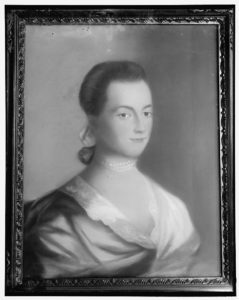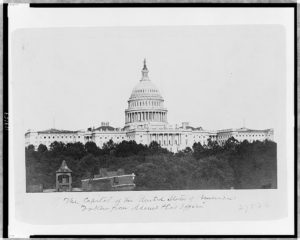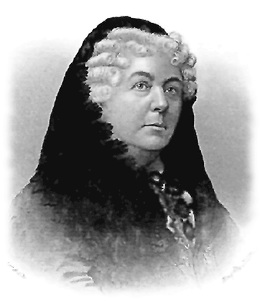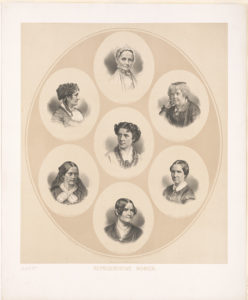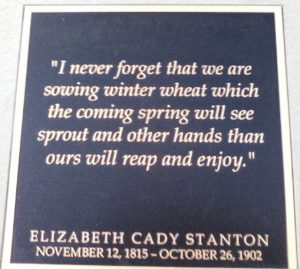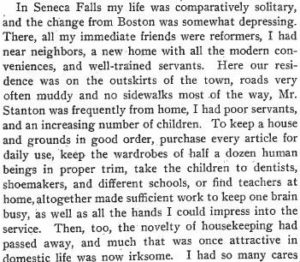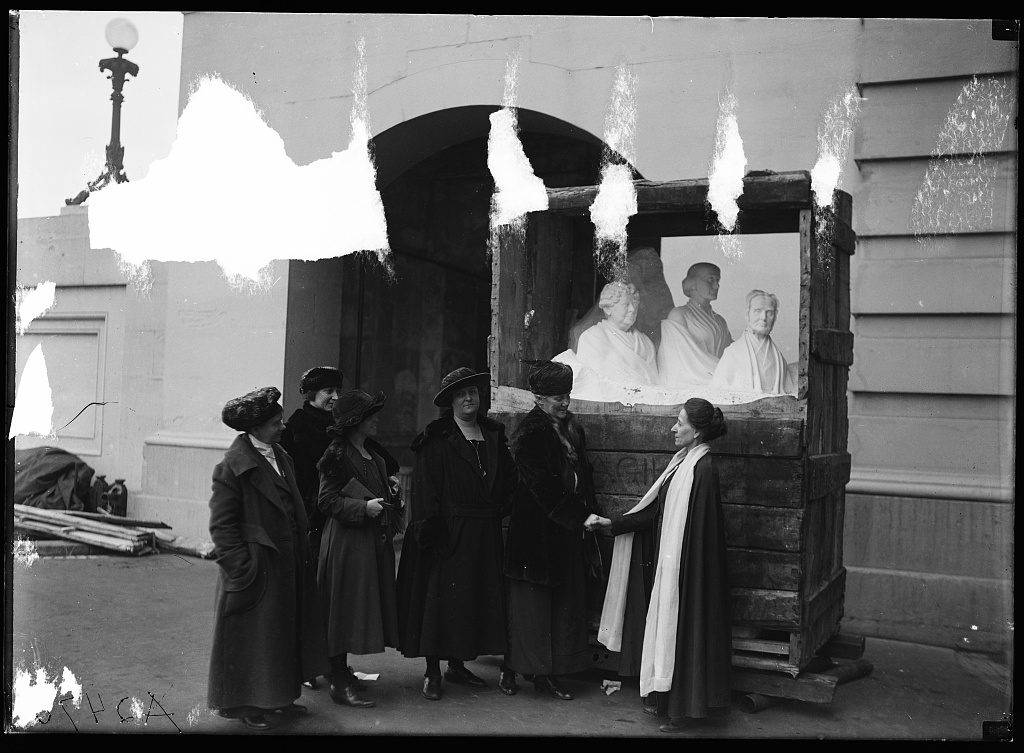I long to hear that you have declared an independency. And in the new code of laws which I suppose it will be necessary for you to make, I desire you would remember the ladies, and be more generous and favorable to them than your ancestors … If particular care and attention is not paid to the ladies, we are determined to foment a rebellion and will not hold ourselves bound by any laws in which we have no voice or representation.
ABIGAIL ADAMS: Letter to John Adams, 1774.[1]*
______________________________________________
______________________________________________
From a Seneca County, New York newspaper in 1866:
A WOMAN FOR CONGRESS. – Mrs. Elizabeth Cady Stanton announces herself as a candidate for Congress in the Eighth District. She publishes her card in the Anti-Slavery Standard of this week, declaring herself to be in favor of free speech, free press, free trade and free men. She desires a seat in the Fortieth Congress in order that she may have a “voice for universal suffrage.”
The editors might have copied the story from the October 11, 1866 issue of The New-York Times. The articles are basically the same except that The Times wonders why Mrs. Stanton only mentioned free men and ends with “We believe she has not yet received a nomination from any of the regular Conventions.”
Here’s more detail from History of Woman Suffrage, Volume II, edited by Elizabeth Cady Stanton, Susan B. Anthony, and Matilda Joslyn Gage (1881; pages 180-181):
At the November election of this year, Mrs. Stanton offered herself as a candidate for Congress; in order to test the constitutional right of a woman to run for office. This aroused some discussion on this phase of the question, and many were surprised to learn that while women could not vote, they could hold any office in which their constituents might see fit to place them. Theodore Tilton gives the following graphic description of this event in “The Eminent Women”:
In a cabinet of curiosities I have laid away as an interesting relic, a little white ballot, two inches square, and inscribed:
Mrs. Stanton is the only woman in the United States who, as yet, has been a candidate for Congress. In conformity with a practice prevalent in some parts of this country, and very prevalent in England, she nominated herself. The public letter in which she proclaimed herself a candidate was as follows:
To the Electors of the Eighth Congressional District:
Although, by the Constitution of the State of New York woman is denied the elective franchise, yet she is eligible to office; therefore, I present myself to you as a candidate for Representative to Congress. Belonging to a disfranchised class, I have no political antecedents to recommend me to your support,—but my creed is free speech, free press, free men, and free trade,—the cardinal points of democracy. Viewing all questions from the stand-point of principle rather than expediency, there is a fixed uniform law, as yet unrecognized by either of the leading parties, governing alike the social and political life of men and nations. The Republican party has occasionally a clear vision of personal rights, though in its protective policy it seems wholly blind to the rights of property and interests of commerce; while it recognizes the duty of benevolence between man and man, it teaches the narrowest selfishness in trade between nations. The Democrats, on the contrary, while holding sound and liberal principles on trade and commerce, have ever in their political affiliations maintained the idea of class and caste among men—an idea wholly at variance with the genius of our free institutions and fatal to high civilization. One party fails at one point and one at another.
In asking your suffrages—believing alike in free men and free trade—I could not represent either party as now constituted. Nevertheless, as an Independent Candidate, I desire an election at this time, as a rebuke to the dominant party for its retrogressive legislation in so amending the National Constitution as to make invidious distinctions on the ground of sex. That instrument recognizes as persons all citizens who obey the laws and support the State, and if the Constitutions of the several States were brought into harmony with the broad principles of the Federal Constitution, the women of the Nation would no longer be taxed without representation, or governed without their consent. Not one word should be added to that great charter of rights to the insult or injury of the humblest of our citizens. I would gladly have a voice and vote in the Fortieth Congress to demand universal suffrage, that thus a republican form of government might be secured to every State in the Union.
If the party now in the ascendency makes its demand for “Negro Suffrage” in good faith, on the ground of natural right, and because the highest good of the State demands that the republican idea be vindicated, on no principle of justice or safety can the women of the nation be ignored. In view of the fact that the Freedmen of the South and the millions of foreigners now crowding our shores, most of whom represent neither property, education, nor civilization, are all in the progress of events to be enfranchised, the best interests of the nation demand that we outweigh this incoming pauperism, ignorance, and degradation, with the wealth, education, and refinement of the women of the republic. On the high ground of safety to the Nation, and justice to citizens, I ask your support in the coming election.
Elizabeth Cady Stanton.
New York, Oct. 10, 1866.
Elizabeth Cady Stanton was in the news earlier that year. From a Seneca County, New York newspaper on April 14, 1866:
THE GOLDEN OPPORTUNITY. – Our whilom townswoman, Mrs. Elizabeth Cady Stanton, as President of the National Woman’s Rights Committee, insists that at this hour the nation needs the highest thought and inspiration of a true womanhood infused into every vein and artery of its life; and woman needs a broader, deeper education, such as a pure religion and lofty patriotism alone can give. From the baptism of this second revolution should not woman come forth with new strength and dignity, clothed in all those “rights, privileges, and immunities” that shall best enable her to fulfill her highest duties to humanity, her country, her family and herself? Of course she should! By all means let the dear creatures come! Who’s afraid?
Apparently the editors based the above on the announcement of an “Eleventh National Woman’s Rights Convention” to be held in New York City on May 10, 1866. The call appeared in the April 2, 1866 issue of The New-York Times. Elizabeth Cady Stanton and Susan B. Anthony said that nobody could call the republican ideal a failure until it had been genuinely tried by ensuring equal rights for all. They disagreed with federal legislation that would promote voting rights for black men but ignore all women:
“… while our representatives at Washington are discussing the right of suffrage for the black man, as the only protection to life, liberty and happiness, they deny that “necessity of citizenship” to woman, by proposing to introduce the word “male” into the Federal Constitution. In securing suffrage but to another shade of manhood, while we disfranchise fifteen million tax-payers, we come not one line nearer the republican idea. Can a ballot in the hand of a woman, and dignity on her brow, more unsex her than do a sceptre and a crown?” [Britain’s Queen Victoria] …
___________________________________________________
___________________________________________________
Whilom indeed. In her 1898 autobiography Elizabeth Cady Stanton described the shock of moving from Boston to Seneca Falls in 1847 (pages 143-148):
Nevertheless, Mrs. Stanton certainly made good use of her desert experience. She began to appreciate the difficult life of women who didn’t have good servants and could appreciare Ralph Waldo Emerson’s statement that “A healthy discontent is the first step to progress.” There were many reformers in central New York State. She played a major role in the Seneca Falls “Woman’s Rights Convention” on July 19 and 20, 1848. AS a matter of fact, she was the chief author of “A Declaration of Sentiments” that she read at the convention. The document, which proclaimed that “all men and women are created equal”, was modeled closely on that 1776 declaration of “independency.” In 1862 Mrs. Stanton moved to New York City, where she ran for Congress 150 years ago.
You can read and see more about Elizabeth Cady Stanton’s life at the National Park Service, including a photo from about 1865. The winter wheat plaque is on the left side mini-column at the Elizabeth Cady Stanton Park. The park is just across the street from the reconstructed Wesleyan Chapel, where the 1848 convention met. Across the canal from the park is the old Seneca Knitting Mills, which employed women during the Civil War. I believe the mills is going to become the new home of the National Women’s Hall of Fame.
*According to the Library of Congress, Abigail Adams’ letter to John was written in 1776.
The portrait of Elizabeth Cady Stanton comes from wpclipart. From the Library of Congress: Abigail Adams, capitol, seven women, sculpture (I believe the live woman to the far right is sculptor Adelaide Johnston).
- [1]Seldes, George, compiler. The Great Quotations. 1960. New York: Pocket Books, 1967. Print. pages 557-558.↩

